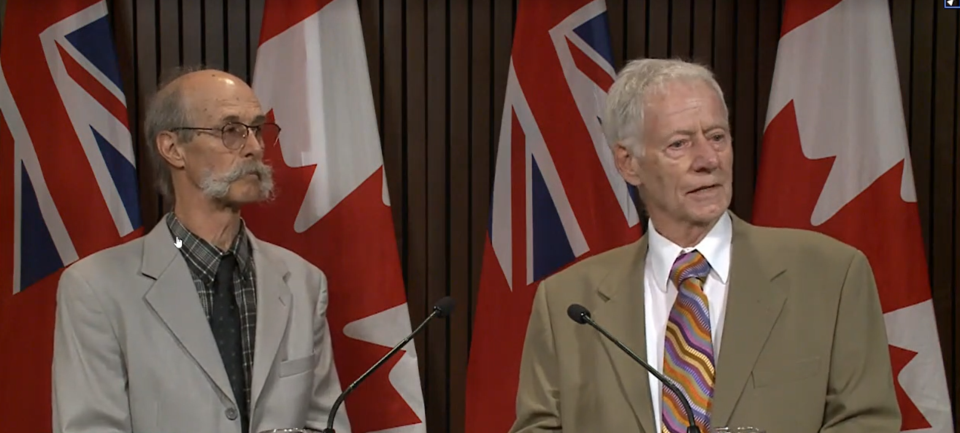TORONTO — Two activist groups opposing the storage of nuclear waste in a deep geological repository are calling on the Ford government to mandate that a proximity principle to have the material stored cosser to where it is generated.
Members of We the Nuclear Free North in Northern Ontario from Northwestern Ontario and Protect Our Waterways – No Nuclear Waste in Southwestern Ontario have collected 1,141 signatures, with the petition presented in Queens Park on tuesday by Thunder Bay-Superior North MPP Lise Vaugeois, Kiiwetinoong MPP Sol Mamakwa and Green Party Leader Mike Schreiner.
“Their plan is not very well defined for the deep geological repository and it has several questionable areas. One of which is an option for a shallow cavern, which if approved, could see nuclear waste being moved into the area before the deep geological repository is complete and in operation,” said Charles Faust, a representative with We the Nuclear Free North.
Faust argued that the Nuclear Waste Management Organization’s plan to transport nuclear waste from power plants to a deep geological repository is “questionable.”
“I want you to remember 1,694. That’s the number of kilometres that it takes for a one-way trip from the average site of nuclear waste storage in Southern Ontario to the Ignace area — 1,694 kilometres," Faust said. "They’re proposing two to three trucks a day, every day, for 50 years. That’s to deal with the 50,000 tonnes that are out there right now that they are looking for a place to be deposited.”
According to Faust, the concern with the transportation of nuclear waste is that Nuclear Waste Management Organization’s transportation phase is still in the early stages of development.
Bill Noll, a representative with Protect Our Waterways, expressed concern that once the nuclear waste reaches its destination, the fuel bundles will be sent to a repackaged facility and then stored in the repository.
“The repackaging facility is really unique. No other countries, Sweden, Finland, or any other country that I am aware of, is actually thinking about repackaging capability in what is a very small container,” said Noll.
Noll claimed the issue with nuclear waste is the spent heat that is generated.
“This is one of the real issues with the whole idea of how long it will last. It is a function of how much heat will be generated and how much damage that heat will do to not only the rock, but the container itself,” Noll said.
Both activist groups proposed that the solution to their concern would be for the Ford government to implement a proximity principle.
“Nuclear fuel waste should be managed at the point of generation by making on-site storage more robust and adopting a program of rolling stewardship for the long-term management of radioactive at or near its current location,” said Faust.
Faust said that the proximity principle is a method used by the European government for waste management.
In a statement issued Tuesday afternoon, Nuclear Waste Management Organization spokesperson Vince Ponka elaborated that Europe’s use of the proximity principle is for “conventional municipal waste and recycling — not used nuclear fuel.”
Ponka also said the proximity principle would also need free, prior, and informed consent from Indigenous groups as the principle does not align with United Nations Declaration on the Rights of Indigenous People.
“Arbitrarily siting a waste facility near an existing nuclear facility would mean nearby municipalities and First Nations would have no say — that's just not right,” Ponka said. “The proximity principle conflicts with the values and priorities that Canadians and Indigenous peoples identified as important in siting a used nuclear fuel repository - that site selection should only proceed in an area with informed and willing hosts.”
During the press conference, Vaugeois called the process of managing Canada’s nuclear waste “undemocratic.”
“It’s going to be left to a very small number of people where this actually affects people across the entire province when you consider the waste will be transported on major highways in Ontario over a period of 50 years,” said Vaugeois.
